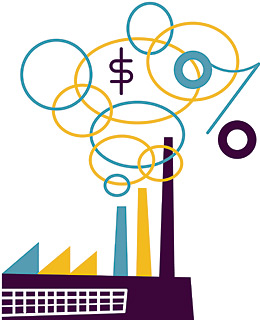There was an op-ed in Canada’s Globe & Mail last week by Todd Hirsch, a Calgary-based senior economist at a financial firm out there: “Debt is the new carbon.” His premise was essentially as his title states, that climate change, despite a lack of action to date, will fall off governmental agendas to be replaced by a focus on debt reduction. Hmmm. Except he missed the point that the two are not necessarily mutually exclusive.
The New York Times editorialized recently about revenue sources that will indeed need to be confronted in what is likely to be a difficult political debate. A carbon tax is staring Americans in the face as an opportunity:
Congress should consider raising revenues in other ways, like a value-added tax, or carbon taxes. That way all of the needed revenue for deficit reduction, and for what government provides, does not need to be squeezed from the income tax. A value-added tax is conducive to saving, and a carbon tax helps protect the environment.
Joe Romm at Climate Progress also set out the case for a carbon tax’s possible introduction in the U.S. as part of a future debt ceiling deal after an Obama re-election (which he puts at 50-50). He cited this point from a Climate Wire piece in his blog item:
“A carbon tax could be an appealing alternative to even more ambitious cuts to entitlements and defense spending as well as a national value-added tax, repealing the home mortgage tax deduction, or higher income taxes,” [economist Joe] Aldy said in an email. “A well-designed carbon tax could raise some revenues to finance deficit reduction and enable a reduction in payroll tax rates, for example.”
In Canada, Professor Harrison of UBC recently made the argument as well:
…carbon taxes offer some near-term economic, and thus political, advantages that may have been underestimated.
In particular, carbon taxes bring in government revenues that can be deployed for various purposes: investing in clean-energy infrastructure and (politically popular) job creation; stimulating the economy by cutting other, less efficient, taxes; and reducing government deficits at a time when traditional revenue sources are not delivering. The last of these probably accounts for the “public benefit surcharges” on electricity that some two-dozen U.S. states have quietly adopted in recent years. It has arguably also contributed to the survival of the B.C. carbon tax (and several long-established European carbon taxes), the revenues from which are essential to avoiding increases in other taxes.
So, it doesn’t seem to be as simple as Hirsch made it out to be in his Globe op-ed where he concluded “Sorry, carbon, you’ve been replaced” as a focus of governments in favour of debt reduction. Carbon and debt reduction could go hand in hand.

